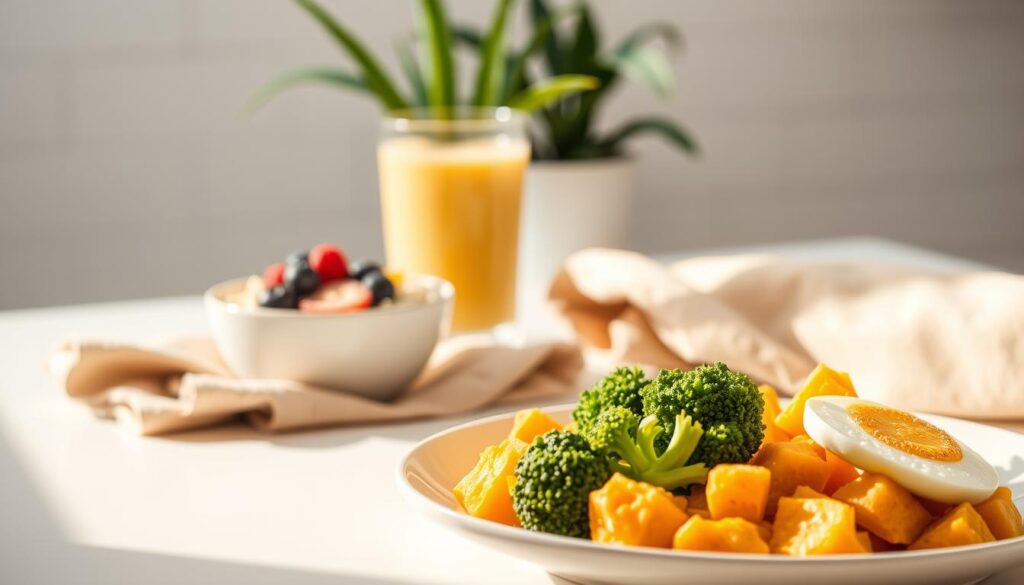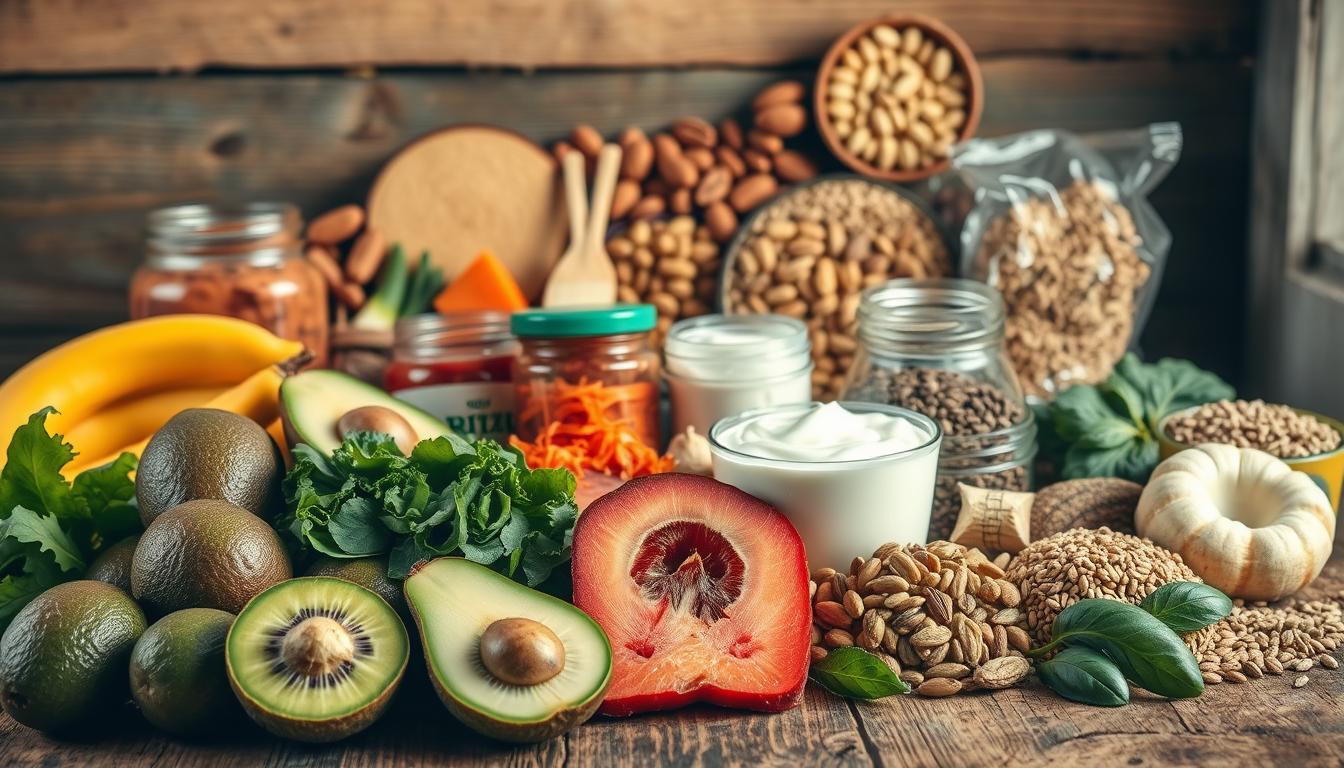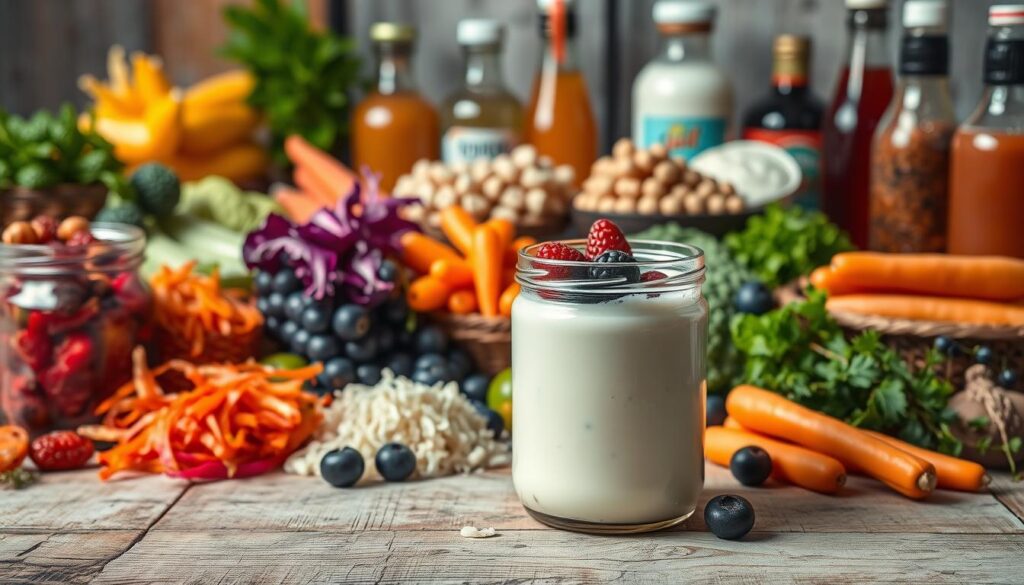Are you tired of feeling sluggish and uncomfortable after meals? Could your diet be the key to unlocking a happier, healthier gut? A growing body of research suggests that the foods we eat play a crucial role in maintaining a balanced digestive system. By incorporating the right foods into your diet, you can significantly improve your overall well-being.
In this article, we’ll explore the top gut-friendly foods that can help optimize your digestive health. From fiber-rich fruits to probiotic-packed yogurts, we’ll dive into the digestive health tips you need to know to start feeling your best.
Key Takeaways
Table of Contents
- Discover the most beneficial foods for supporting gut health
- Learn how to incorporate gut-friendly foods into your daily diet
- Understand the importance of digestive health for overall well-being
- Explore simple tips for maintaining a healthy gut
- Find out how the right foods can improve your digestion and energy levels
Understanding the Gut Microbiome and Digestive Health
The gut microbiome plays a crucial role in our overall health, and understanding its functions can lead to better digestive health. It consists of trillions of microorganisms that live in our gastrointestinal tract and influence various bodily functions, from digestion to immune response.
The Role of Gut Bacteria in Overall Health
Gut bacteria are essential for breaking down complex foods, absorbing nutrients, and producing certain vitamins. They also play a significant role in maintaining a healthy immune system and producing hormones that influence mood and appetite. A balanced gut microbiome can lead to improved overall health and well-being.
How Diet Affects Your Digestive System
Diet has a profound impact on the gut microbiome. Consuming probiotic-rich foods like yogurt and kefir can help maintain a healthy balance of gut bacteria. On the other hand, a diet high in processed foods and sugar can disrupt this balance, leading to digestive issues. Incorporating gut-friendly foods such as fermented vegetables into your diet can support digestive health.
- Probiotic-rich foods: yogurt, kefir
- Fermented vegetables: sauerkraut, kimchi
- Fiber-rich foods: fruits, vegetables, whole grains
Signs of an Unhealthy Gut and Why You Should Care
Signs of an unhealthy gut include bloating, abdominal pain, and changes in bowel movements. If left unaddressed, an imbalance in the gut microbiome can lead to more severe health issues, such as inflammatory bowel disease and mental health disorders. Recognizing these signs and taking action to restore balance to your gut microbiome is crucial for maintaining overall health.
Best Foods for Gut Health and Digestion
A balanced diet rich in specific nutrients can significantly enhance gut health and digestion. Consuming the right foods can help maintain a healthy gut microbiome, which is essential for overall well-being.
Probiotic-Rich Foods: Yogurt, Kefir, and Fermented Vegetables
Probiotic-rich foods are essential for introducing beneficial bacteria into your gut. Foods like yogurt, kefir, and fermented vegetables such as sauerkraut and kimchi are rich in live cultures that help populate your gut with healthy bacteria. Incorporating these foods into your diet can enhance digestion and boost your immune system.
For example, yogurt contains Lactobacillus and Bifidobacterium, which are known to improve gut health. Kefir, a fermented milk product, has a wider variety of bacterial strains and is often easier to digest than regular yogurt.
Prebiotic Foods: Garlic, Onions, Bananas, and More
Prebiotic foods play a crucial role in feeding the good bacteria in your gut, helping them thrive. Foods like garlic, onions, bananas, and asparagus are rich in prebiotic fibers. These foods help create a favorable environment for beneficial bacteria to grow, enhancing overall gut health.
Including prebiotic-rich foods in your diet can improve digestion, reduce symptoms of irritable bowel syndrome (IBS), and support the immune system.
Anti-Inflammatory Foods: Turmeric, Ginger, and Fatty Fish
Anti-inflammatory foods can help reduce inflammation in the gut, promoting a healthier digestive system. Turmeric contains curcumin, a compound known for its anti-inflammatory properties. Ginger has been shown to aid digestion and reduce nausea. Fatty fish like salmon are rich in omega-3 fatty acids, which help reduce inflammation throughout the body.
Incorporating these foods into your diet can help alleviate symptoms of digestive disorders and promote overall gut health.
Fiber-Rich Foods for Optimal Digestion
Fiber is a key nutrient that supports healthy digestion, and incorporating fiber-rich foods into your diet can have numerous benefits. A high-fiber diet helps in the smooth movement of food through the digestive system, preventing constipation and reducing the risk of digestive disorders.
Soluble Fiber Sources: Oats, Apples, and Legumes
Soluble fiber dissolves in water to form a gel-like substance that helps slow down digestion, allowing for better nutrient absorption. Foods rich in soluble fiber include:
- Oats and oat bran
- Apples and citrus fruits
- Legumes like beans, lentils, and peas
These foods not only support digestive health but also help in managing blood sugar levels and cholesterol.
Insoluble Fiber Sources: Whole Grains, Nuts, and Seeds
Insoluble fiber adds bulk to stool and helps food pass more quickly through the stomach and intestines. Sources of insoluble fiber include:
- Whole grains like brown rice, quinoa, and whole-wheat bread
- Nuts and seeds like almonds, chia seeds, and flaxseeds
Increasing intake of these foods can help prevent constipation and support healthy digestion.
How to Gradually Increase Fiber Without Digestive Discomfort
To avoid digestive discomfort when increasing fiber intake, it’s essential to do so gradually. Start by adding a small amount of fiber-rich foods to your meals and gradually increase the amount over a few weeks. Also, make sure to:
- Drink plenty of water to help fiber move through your digestive system
- Mix different types of fiber-rich foods to get a variety of benefits
- Monitor your body’s response and adjust your intake accordingly
By incorporating these tips, you can enjoy the benefits of a high-fiber diet without experiencing discomfort.
Easy-to-Digest Foods for Sensitive Stomachs
Digestive discomfort can be alleviated with the right food choices. For individuals with sensitive stomachs, certain foods can help reduce symptoms like bloating, cramps, and diarrhea. Incorporating these foods into your diet can lead to a more comfortable digestive experience.
Gentle Foods for Digestive Flare-Ups
During digestive flare-ups, opting for gentle foods can provide relief. Bone broth is an excellent choice, as it’s easy on the stomach and rich in nutrients. Cooked vegetables are another good option, as they are soft and less likely to irritate the digestive system. Other beneficial foods include bananas, avocados, and lean proteins like chicken or fish.

Foods to Avoid When Experiencing Digestive Issues
When dealing with digestive issues, it’s crucial to avoid foods that can exacerbate the problem. Common culprits include high-fat foods, spicy dishes, and caffeine. Additionally, foods high in sugar and dairy products can also trigger discomfort in some individuals. Being mindful of these potential irritants can help manage symptoms.
Creating a Balanced Meal Plan for Sensitive Digestion
Developing a balanced meal plan involves selecting foods that are both nourishing and gentle on the stomach. Start by incorporating probiotics like yogurt or kefir to support gut health. Include a variety of fiber-rich foods such as cooked vegetables, fruits, and whole grains to promote regular digestion. It’s also beneficial to eat smaller, more frequent meals to ease the digestive process.
By focusing on easy-to-digest foods and avoiding potential irritants, individuals with sensitive stomachs can significantly improve their digestive health. A well-planned diet not only alleviates discomfort but also supports overall well-being.
Practical Tips for Improving Gut Health Through Diet
Enhancing gut health through diet involves more than just food choices; it includes how and when you eat. Adopting a balanced diet rich in gut-friendly foods is essential, but so are the habits surrounding your meals.
Meal Timing and Eating Habits That Support Digestion
Eating at consistent times each day helps regulate your digestive system. It’s also beneficial to eat slowly and mindfully, as this reduces stress and aids digestion. Avoiding heavy meals close to bedtime can also improve gut health by allowing for proper digestion before sleep.
Simple Food Swaps for Better Digestive Health
Making simple swaps in your diet can significantly impact your digestive health. For example, choosing whole grains over refined grains increases fiber intake, which is beneficial for gut health. Replacing processed snacks with fruits or vegetables can also support a healthy gut microbiome.
Hydration and Gut-Friendly Beverages
Adequate hydration is crucial for digestive health, as water helps dissolve nutrients and soluble fiber, making them more accessible to your body. Incorporating gut-friendly beverages like herbal teas or kefir can also support gut health. Limiting sugary drinks and caffeine, which can disrupt gut bacteria, is also advisable.
| Beverage | Benefits for Gut Health |
|---|---|
| Herbal Teas | Soothes the digestive system, reduces inflammation |
| Kefir | Rich in probiotics, supports healthy gut bacteria |
| Water | Aids in digestion, helps prevent constipation |
By incorporating these digestive health tips into your daily routine, you can significantly improve your gut health. Remember, it’s about creating a balanced approach that includes foods for healthy gut flora and healthy eating habits.
Conclusion: Building a Sustainable Gut-Friendly Diet
By incorporating the best foods for gut health and digestion into your daily meals, you can significantly improve your overall well-being. A balanced diet rich in probiotics, prebiotics, and fiber can help maintain a healthy gut microbiome, supporting optimal digestion and boosting your immune system.
Gut-healing foods such as fermented vegetables, yogurt, and kefir can be easily integrated into your meal plan. Combining these foods with a variety of whole grains, fruits, and vegetables will provide your gut with the necessary nutrients to function properly.
To make lasting changes, focus on developing sustainable eating habits. Start by making simple food swaps, such as choosing whole grains over refined grains, and gradually increase your fiber intake to avoid digestive discomfort. Staying hydrated by drinking plenty of water and incorporating gut-friendly beverages like kefir or kombucha can also support digestive health.
By adopting these habits and being mindful of your food choices, you can promote long-term digestive well-being and enjoy the benefits of a healthy gut. A well-balanced diet is key to maintaining a happy and healthy gut, so start making changes today to nourish your body and support your overall health.
FAQ
What are the best probiotic-rich foods for gut health?
Some of the best probiotic-rich foods include yogurt, kefir, fermented vegetables like sauerkraut and kimchi, and fermented soy products like miso and tempeh. These foods contain live cultures that can help support the growth of beneficial gut bacteria.
How do prebiotic foods support gut health?
Prebiotic foods, such as garlic, onions, bananas, and asparagus, contain non-digestible fibers that serve as food for beneficial gut bacteria. By consuming these foods, you can help promote the growth of good bacteria in your gut, supporting a healthy gut microbiome.
What are some easy-to-digest foods for sensitive stomachs?
Gentle foods like bone broth, cooked vegetables, and lean proteins can be easy on the digestive system. Avoiding spicy, fatty, or high-fiber foods during digestive flare-ups can also help alleviate discomfort.
How can I increase my fiber intake without experiencing digestive discomfort?
Gradually increasing your fiber intake over a period of days or weeks can help your gut microbiome adjust. Start with small portions of high-fiber foods like oats, apples, and legumes, and drink plenty of water to help fiber move through your digestive system.
What are some gut-healing foods that can help reduce inflammation?
Foods rich in omega-3 fatty acids, such as fatty fish, and anti-inflammatory spices like turmeric and ginger can help reduce gut inflammation. Other gut-healing foods include fermented foods, bone broth, and easily digestible proteins.
How does hydration impact gut health?
Adequate hydration is essential for maintaining a healthy gut. Water helps dissolve nutrients and soluble fiber, making them more accessible to the body. It also helps prevent constipation by softening stool and promoting regular bowel movements.
Are there any specific foods that can help support digestive health during stress?
Yes, certain foods like ginger, peppermint, and chamomile tea may help soothe the digestive system during stressful periods. Additionally, maintaining a balanced diet rich in whole foods, fiber, and probiotics can help support overall digestive health.

